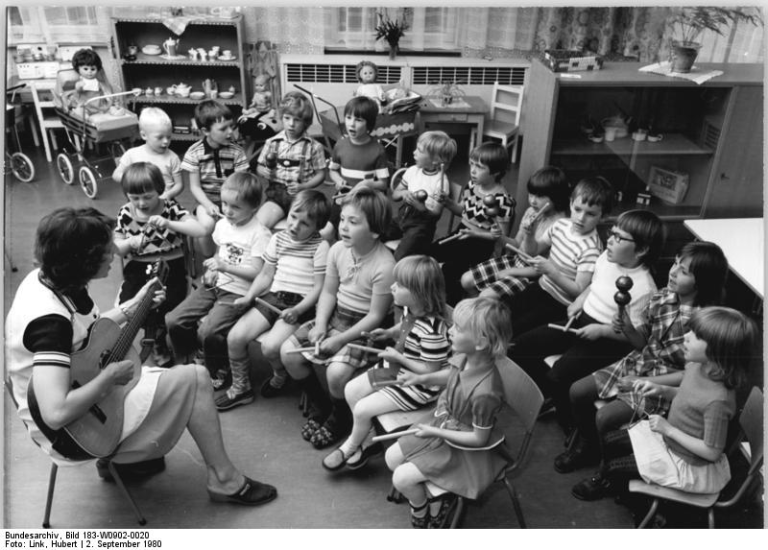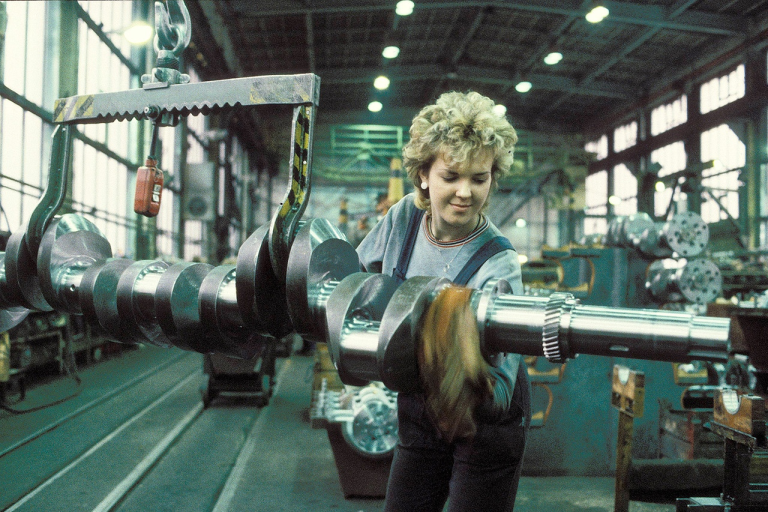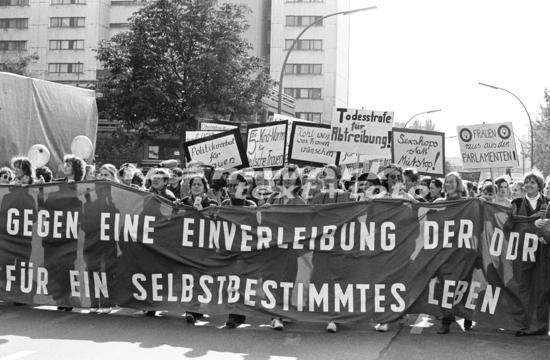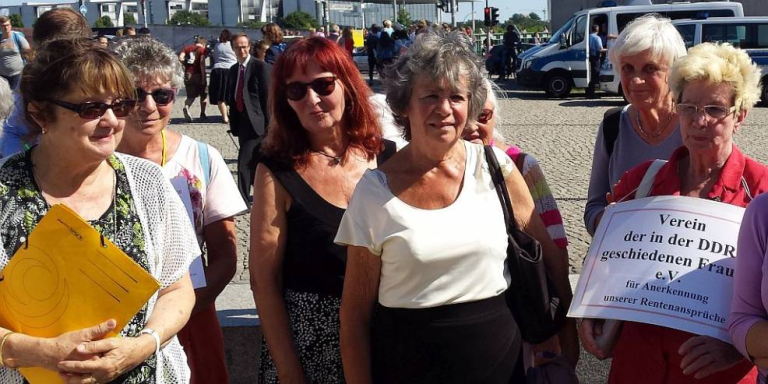The following interview was conducted by women from the group Proletarian Autonomy Magdeburg, as part of the Volkstimmungs editorial team, with a Magdeburg woman on 16 February 2020.
The Magdeburger Volksstimmung is a local newspaper that is put into letterboxes free of charge in the neighbourhoods of Stadtfeld Ost and West and distributed directly to people.
Thank you for letting us interview you today. Please introduce yourself briefly.
I was born here in Magdeburg in 1949 and have always lived in Magdeburg. At the age of 14 I went into production because I was not allowed to learn my dream job as a gardener. I was told I was too skinny and couldn’t lift a shovel handle… So I went into production in protest! But I promised my father that I would continue my education. That’s what I did, first as a machine accountant in the municipal savings bank and then as an IT specialist in the greenhouse facilities. I have been divorced for 10 years and live alone with a cat. As a youth I was organised in the FDJ and later in the FDGB (Free German Trade Union Federation, editor’s note). I have now been a trade union member for 43 years. After the end of the GDR, I was no longer organised for many years, because as a convinced socialist I was disappointed by the SED leadership and its revisionist betrayal for a long time. Today I am in the women’s association Courage. In 2011, among other things, we were present at the first self-organised world women’s conference in Venezuela.
Now let’s get to the real issue. Can you tell us something about the situation of women in the GDR during the early days?
For women who worked in the factories, there were so-called “Heinzelmännchenbrigaden” (little helpers’ brigades), which were supposed to relieve women of housework. For example, dirty laundry was collected directly from home and then washed and ironed and returned. In addition, the children in the kindergartens were cared for all day and received their meals in the canteen, so that women did not have to do all the housework after work, but could enjoy time for herself and her family. One day a month, women were released from work. They were given a paid day off to do things they couldn’t do because of their full-time jobs – there were hardly any part-time jobs – and the children. So we could use this day for our personal development and our family.

How did the whole thing develop in the course of the GDR? What was the professional situation like for women in general?
Unfortunately, these “Heinzelmännchen” brigades were later disbanded. One reason for this was, of course, technical progress, which made housework easier, for example, in the form of washing machines. The dissolution of the Heinzelmännchenbrigaden led to women once again doing more of the housework. In the professional world of the GDR, too, there were the typical “women’s jobs” that were paid less than “men’s jobs”. In addition, the high general director posts were reserved for men. Women could also become heads of department, but the very high posts were filled by men. So you can see that patriarchy was not abolished in the GDR either. Women’s main focus was supposed to be on family work. For example, if the child was sick, a woman stayed home from work and took care of the child. However, if a woman worked in manual jobs or at the workbench, she earned as much as the man next to her. I would like to add that women were not financially dependent on men, even if they may have earned less wages. With the money they had, they were able to make ends meet even with children.
What about self-determination over one’s own body and living out one’s own sexuality?
Since 1974, there was a right to free abortion. The contraceptive pill was also free. We could decide to have a child or not. That was a great liberation. I also think of my mother, who gave birth to seven children – and she certainly wouldn’t have had all of them if she had been able to decide freely about her body.
You said earlier that women made extensive use of these possibilities of self-determination, so that at some point the state got into “child distress” with regard to its production output. Perhaps you could briefly tell us the methods that were used to try to give women incentives to bear more children again.
Yes, there was this so-called birth crunch. The state then thought about how to have children again. For example, there was a state loan of 5,000 marks for marriages. When one child was born, the couple only had to pay back 4000 Marks, with two children only 3000 Marks, and with three children and more, they didn’t have to pay anything back. The sum that may have already been repaid to the state itself was also paid out again.

We’ re talking about typical man-woman families all the time now. What was the situation like with homosexuality in the GDR? Were lesbians also able to live out their sexuality openly?
It wasn’t talked about at all. People kept quiet about it. There was virtually no such thing in this very patriarchal socialism.
That’s very interesting, isn’t it? Normally, this repression of homosexuality is primarily known from more strictly religious states or societies. And the GDR was a state that had nothing whatsoever to do with religion.
Yes, they always say that the smallest cell of the state is the family. That was also true in the GDR, except that according to a patriarchal view, the core of socialism was the heterosexual family. A lot was done for the family in general. Holidays were organised in the FDGB home or children’s holiday camps were organised for very little money, so that the parents had time for themselves and the children could experience adventures. But homosexuality was unfortunately not talked about at all.
I would like to ask you a few questions about the transition period. In 89/90 there was this great period of upheaval and finally the annexation to the Federal Republic of Germany. What was the mood like among women? What were the demands?
The mood was: we wanted a different, better GDR. We wanted real socialism, which was always promised to us but did not exist. For example, there were VEBs (state-owned enterprises, editor’s note), but they didn’t really produce for the people, for us. We wanted to be able to consume everything we produced. The selling off of goods enraged the people. We also wanted the wages of our work, our money, to be worth something, to be able to travel and so on. That’s what we took to the streets for. We didn’t want capitalism.

How would you assess the changes that happened? Did it improve or worsen for East German women?
In my estimation, it has become worse for women. For example, pension promises to women were not kept. A big pension fraud was committed in the Unification Treaty. Nurses and hairdressers, and other women in “women’s professions”, were paid less at the time and were promised that this money would be added to their pensions. This was simply swept under the table in the Unification Treaty. Women who divorced in the GDR do not get pension compensation either. They have been taking to the streets against this since the annexation to the FRG and have even been to Brussels. Even Brussels said that the FRG had to change this, that it was an inequality. We’ll see what comes of it. But presumably they are waiting for a biological solution to the problem. After all, many women are already very old and partly deceased and will probably hardly be able to enjoy their full pension… Besides, nowadays many women are only employed part-time and have to work in lower-paid jobs. As a result, they earn even less than men. In the GDR there were also lower-paid “women’s jobs”, but the social discrimination and the risk of poverty were not as high as today because of other social security measures. Today, women have to pay for all kinds of things themselves, which used to be covered, and abortions are restricted. I would say women can no longer live as self-determined as they used to.

We still have a little space for your conclusion or last words which you would like to share with us.
I would like to say something about my divorce. When my husband became unemployed after the fall of communism, he not only lost his job, but also his identity and developed an alcohol problem. That’s what finally broke up our marriage. And that is not an individual fate. After the fall of communism, many marriages broke up. My mother warned us in other ways back then: “Don’t look forward to the capitalist. He’ll give you five marks and take seven away again.” And today it is like that, you get 5 euros and 7 euros are taken away from you again… As a conclusion, I would say we had a different women’s consciousness back then. We were more self-determined and therefore more self-confident. I miss that today. We should fight again for the fact that we as women are worth something.
That’s all for now from my side. Thank you for the detailed answers to the questions and the very interesting and personal insight into your life as a woman from Magdeburg.
